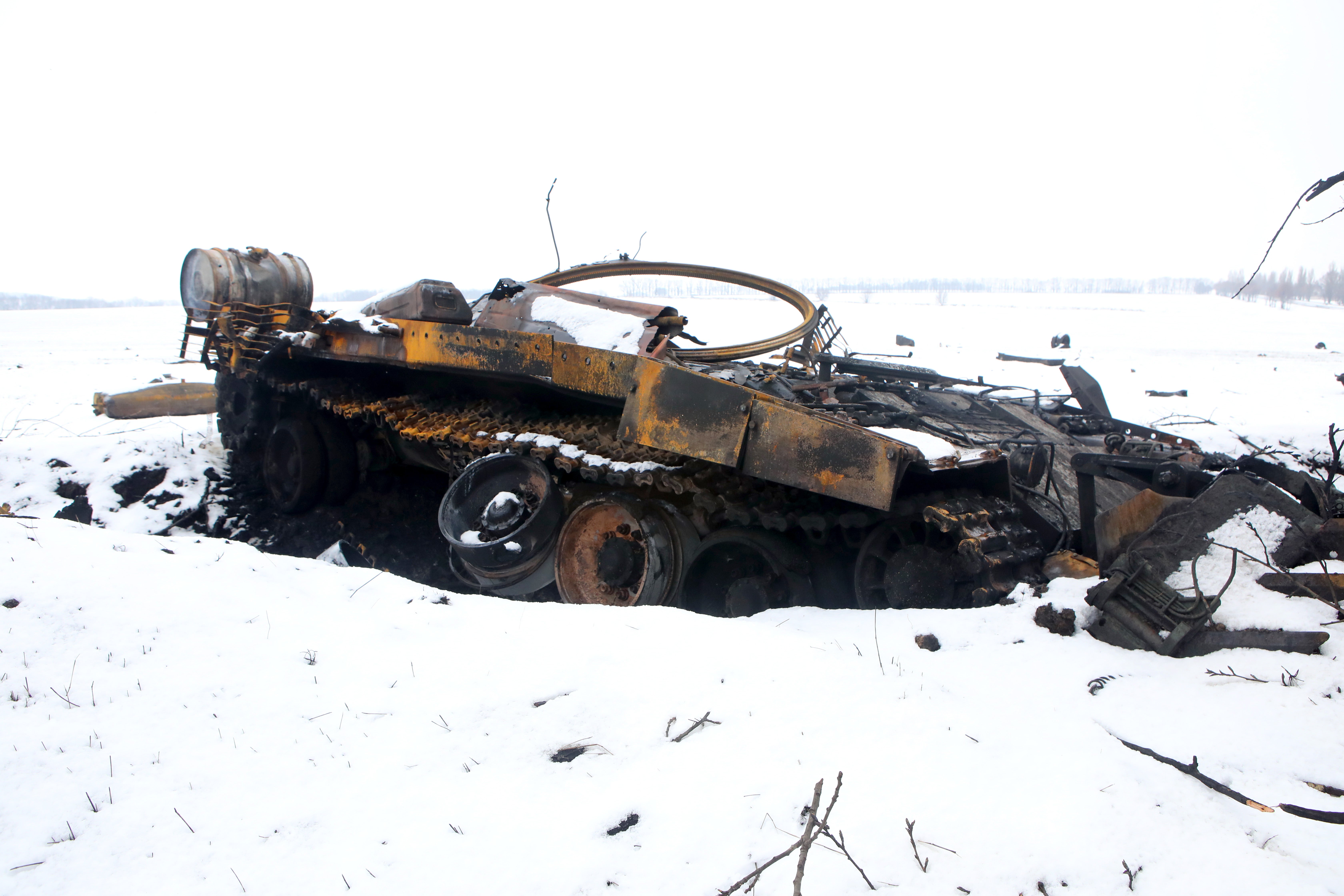Inside Politics: Putin raises stakes with nuclear threat
Two sides to meet at Belarus border for peace talks after Russian presidents puts nuclear forces on high alert, writes Matt Mathers


Putin’s bloody war with Ukraine continues to dominate the news agenda, with updates on the conflict coming in at break-neck speed. The two sides meet at the Belarus border later today for initial peace talks, after the Russian president made a nuclear weapons threat. Volodymyr Zelensky, the Ukraine president, said there were no preconditions for the discussions and warned that he was not optimistic about any potential breakthrough as he again stressed that his country will not give in to the Kremlin’s demands. Prime minister Boris Johnson is coming under increasing pressure to do more for Ukrainians who want to flee the war and come to the UK.
Inside the bubble
Commons action gets underway with Home Office questions at 2.30pm, followed by any urgent questions or ministerial statements. In the main event of the day the Police, Crime, Sentencing and Courts Bill returns to the Commons after the Lords inflicted over 20 defeats on the government.
Coming up:
– Defence secretary Ben Wallace on BBC Radio 4 Today at 8.10am
– Shadow culture secretary Lucy Powell on Times Radio Breakfast at 8.35am
Daily Briefing
MAD VLAD: Putin’s war with Ukraine took yet another dark turn last night after the Russian president put his country’s nuclear forces on “high alert.” In a televised address responding to what he claimed were “aggressive statements” by Nato countries and a fresh tranche of sanctions by western countries, he said: “Western countries aren’t only taking unfriendly actions against our country in the economic sphere, but top officials from leading Nato members made aggressive statements regarding our country.” The move was immediately condemned by western leaders, including Boris Johnson, who said the announcement was a “distraction” from the “difficulties that the Russian forces are experiencing” in Ukraine. Ahead of a United Nation general assembly meeting later, the prime minister told Volodymyr Zelensky, the Ukraine president, that Britain would do all it could to get more arms to his military in the coming days.
STANDING STRONG: Following a dawn missile blitz of reported military targets on day one of the conflict, the Russian advance appears to have got bogged down and not developed as quickly as the Kremlin had hoped. Ukrainian fighters are putting up stiff resistance in Kyiv, where an 8am curfew has been lifted this morning. Meanwhile, Ukraine said it held its second-largest city Kharkiv, following ferocious fighting on Sunday. Russian troops had entered the city overnight on Saturday. “Control over Kharkiv is completely ours!” governor Oleh Synyehubov claimed. “The armed forces, the police, and the defence forces are working, and the city is being completely cleansed of the enemy,” he wrote on Telegram. Military analysts have suggested that Russia, whose forces greatly outsize Ukraine’s, could resort to using overwhelming force in the coming days if it doesn’t meet its objectives. Agreeing to initial peace talks with Russia at the Belarus border, Zelensky said the next 24 hours will be a “crucial period” for Ukraine as he played down the chances of any sort of progress being made at the discussions. Kyiv was said to be quiet last night and early again this morning. But are we witnessing the calm before the storm? Satellite images captured by Maxar Technologies appeared to show a Russian military convoy of more than three miles long travelling along a road towards the capital on Sunday. We’ll have all the latest updates on our liveblog.
BP OUT: The war continues to cause seismic shocks to the global economy. BP, the oil and gas giant, has announced it is ditching its 19.75 per cent stake in Russian oil giant Rosneft, following Putin’s decision to wage a bloody conflict with Ukraine. The move by the UK-listed company to abandon its holding will cost it charges of up to $25bn (£19bn) and comes after growing pressure from the British government over its relationship with Rosneft. In a statement released on Sunday, the oil group also said its chief executive Bernard Looney is resigning from Rosneft’s board with “immediate effect”.BP said Russia’s attack on Ukraine represented a “fundamental change” in how the company could operate there. Meanwhile, the Russian ruble has plunged more than 20 per cent in pre-market trading following further sanctions placed on the country’s financial institutions after the attack on Ukraine. The US and EU have banned some Russian banks from the Swift financial system.
MUST DO MORE: Johnson is coming under increasing pressure to do more to help Ukrainians fleeing the war. He said the UK will be “very generous” with refugees coming to Britain but stopped short of scrapping visa requirements for all those fleeing the war. Ukrainians who have family in the UK will be allowed to come visa free. Labour leader Keir Starmer has also called on ministers to take a “humanitarian approach” to provide “sanctuary for those who are fleeing from Russian aggression, fleeing from this invasion, fleeing for their lives”. UK charities have backed The Independent’s Refugees Welcome campaign, calling on the British government to set up an urgent and properly funded resettlement programme for Ukrainians fleeing the Russian invasion – and to take the lead in offering a wider package of access and support.
DON’T FIGHT: The defence secretary has urged British volunteers not to fight in Ukraine, one day after Liz Truss welcomed them joining the “struggle” against Russia’s invasion.Ben Wallace said only trained military personnel would be of use in the fighting – and that Foreign Office advice to Britons is not to “put yourselves in harm’s way” by making the journey. “Unless you are properly trained, unless you are an experienced member of the armed forces, there are better ways for you to contribute to the security of Ukraine,” he said. Wallace also hinted at a U-turn on the UK’s strongly criticised decision to deny asylum to refugees fleeing Ukraine, unless they are the spouses, civil partners or children of British residents.
On the record
“Control over Kharkiv is completely ours! The Armed Forces of Ukraine, National Police, Teroborona, a complete cleaning of the city from the enemy is happening. The Russian enemy is absolutely demoralized. Directly in Kharkiv, throwing enemy equipment in the middle of the road, Ukrainian troops surrender whole groups of 5-10 people. As soon as you see at least one representative of the zsu - surrender.”
Kharkiv governor Oleh Synyehubov claims Ukraine forces repelled Russian attempt to seize city.
From the Twitterati
“Naturally Putin was sitting a healthy 15 feet away from Shoigu and Gerasimov at the end of a ridiculously long table when he told them to get the nukes out.
FT Moscow bureau chief Max Seddon finds the humour in a dark development.
Essential reading
- Jess Phillips, The Independent: My terrified Ukrainian constituents need visas for their families – it’s the least the UK can do
- Hamish McRae, The Independent: How will Putin’s war affect the global economy long term?
- Sonya Sceats, The Independent: Is Boris Johnson really going to criminalise Ukrainians seeking safety in the UK?
- Sean O’Grady, The Independent: Putin cannot hope for any real victory in this reckless war
Sign up here to receive this free briefing in your email inbox each weekday






Join our commenting forum
Join thought-provoking conversations, follow other Independent readers and see their replies
Comments